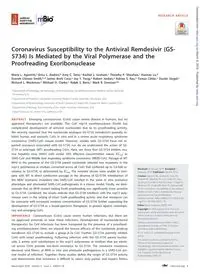
2018 Coronavirus Susceptibility to the Antiviral Remdesivir (GS-5734) Is Mediated by the Viral Polymerase and the Proofr PDF
Preview 2018 Coronavirus Susceptibility to the Antiviral Remdesivir (GS-5734) Is Mediated by the Viral Polymerase and the Proofr
Coronavirus Susceptibility to the Antiviral Remdesivir (GS- 5734) Is Mediated by the Viral Polymerase and the Proofreading Exoribonuclease Maria L. Agostini,a Erica L. Andres,b Amy C. Sims,c Rachel L. Graham,c Timothy P. Sheahan,c Xiaotao Lu,b Everett Clinton Smith,b,d James Brett Case,a Joy Y. Feng,e Robert Jordan,e Adrian S. Ray,e Tomas Cihlar,e Dustin Siegel,e Richard L. Mackman,e Michael O. Clarke,e Ralph S. Baric,c Mark R. Denisona,b aDepartment of Pathology, Microbiology, and Immunology, Vanderbilt University Medical Center, Nashville, Tennessee, USA bDepartment of Pediatrics, Vanderbilt University Medical Center, Nashville, Tennessee, USA cDepartment of Epidemiology, University of North Carolina at Chapel Hill, Chapel Hill, North Carolina, USA dDepartment of Biology, the University of the South, Sewanee, Tennessee, USA eGilead Sciences, Inc., Foster City, California, USA ABSTRACT Emerging coronaviruses (CoVs) cause severe disease in humans, but no approved therapeutics are available. The CoV nsp14 exoribonuclease (ExoN) has complicated development of antiviral nucleosides due to its proofreading activity. We recently reported that the nucleoside analogue GS-5734 (remdesivir) potently in- hibits human and zoonotic CoVs in vitro and in a severe acute respiratory syndrome coronavirus (SARS-CoV) mouse model. However, studies with GS-5734 have not re- ported resistance associated with GS-5734, nor do we understand the action of GS- 5734 in wild-type (WT) proofreading CoVs. Here, we show that GS-5734 inhibits mu- rine hepatitis virus (MHV) with similar 50% effective concentration values (EC50) as SARS-CoV and Middle East respiratory syndrome coronavirus (MERS-CoV). Passage of WT MHV in the presence of the GS-5734 parent nucleoside selected two mutations in the nsp12 polymerase at residues conserved across all CoVs that conferred up to 5.6-fold re- sistance to GS-5734, as determined by EC50. The resistant viruses were unable to com- pete with WT in direct coinfection passage in the absence of GS-5734. Introduction of the MHV resistance mutations into SARS-CoV resulted in the same in vitro resistance phenotype and attenuated SARS-CoV pathogenesis in a mouse model. Finally, we dem- onstrate that an MHV mutant lacking ExoN proofreading was significantly more sensitive to GS-5734. Combined, the results indicate that GS-5734 interferes with the nsp12 poly- merase even in the setting of intact ExoN proofreading activity and that resistance can be overcome with increased, nontoxic concentrations of GS-5734, further supporting the development of GS-5734 as a broad-spectrum therapeutic to protect against contempo- rary and emerging CoVs. IMPORTANCE Coronaviruses (CoVs) cause severe human infections, but there are no approved antivirals to treat these infections. Development of nucleoside-based therapeutics for CoV infections has been hampered by the presence of a proofread- ing exoribonuclease. Here, we expand the known efficacy of the nucleotide prodrug remdesivir (GS-5734) to include a group �-2a CoV. Further, GS-5734 potently inhibits CoVs with intact proofreading. Following selection with the GS-5734 parent nucleo- side, 2 amino acid substitutions in the nsp12 polymerase at residues that are identi- cal across CoVs provide low-level resistance to GS-5734. The resistance mutations decrease viral fitness of MHV in vitro and attenuate pathogenesis in a SARS-CoV ani- mal model of infection. Together, these studies define the target of GS-5734 activity and demonstrate that resistance is difficult to select, only partial, and impairs fitness Received 29 January 2018 Accepted 1 February 2018 Published 6 March 2018 Citation Agostini ML, Andres EL, Sims AC, Graham RL, Sheahan TP, Lu X, Smith EC, Case JB, Feng JY, Jordan R, Ray AS, Cihlar T, Siegel D, Mackman RL, Clarke MO, Baric RS, Denison MR. 2018. Coronavirus susceptibility to the antiviral remdesivir (GS-5734) is mediated by the viral polymerase and the proofreading exoribonuclease. mBio 9:e00221-18. https://doi .org/10.1128/mBio.00221-18. Editor Kanta Subbarao, NIAID, NIH Copyright © 2018 Agostini et al. This is an open-access article distributed under the terms of the Creative Commons Attribution 4.0 International license. Address correspondence to Ralph S. Baric,
